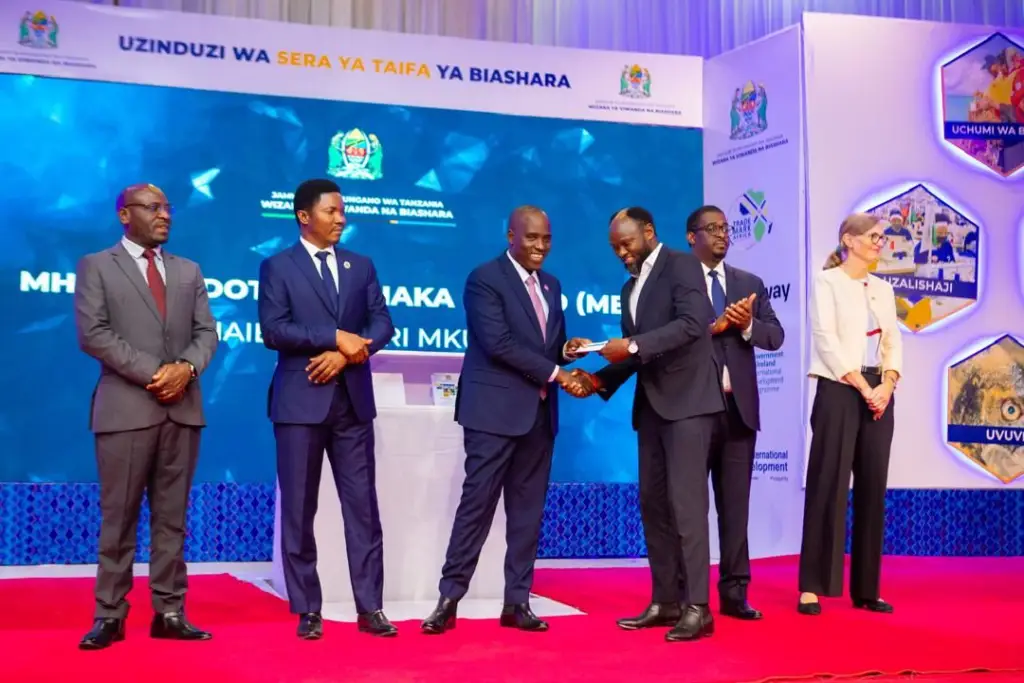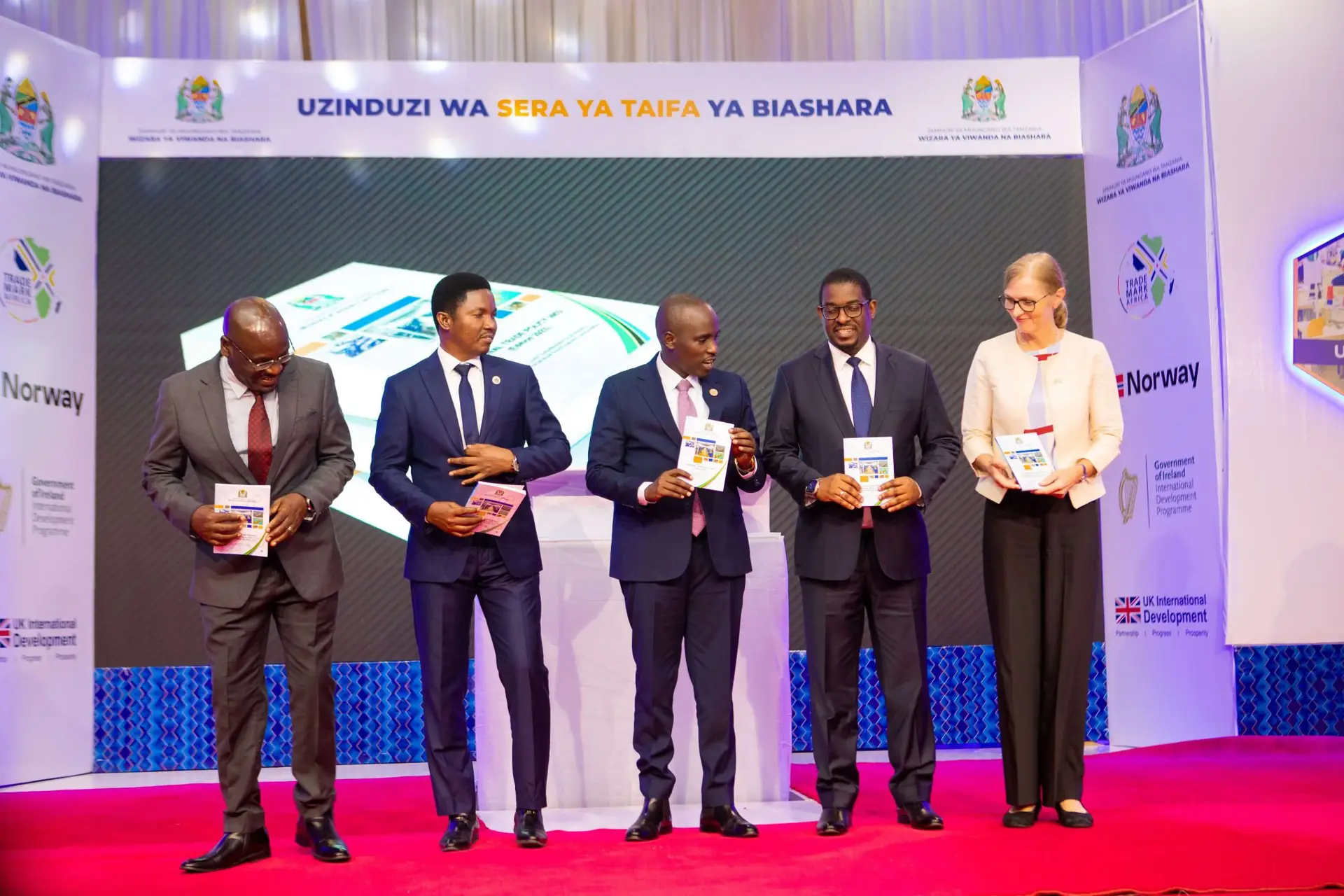Yesterday, 30 July 2024, marked a historic milestone for Tanzania’s trade landscape. The Government of the United Republic of Tanzania, through the Ministry of Industry and Trade, in collaboration with TradeMark Africa (TMA), launched the Tanzania National Trade Policy (NTP) 2023 Edition. This policy represents a significant advancement in Tanzania’s trade development, emphasising enhanced policy coherence, robust legal and regulatory frameworks, and improved institutional coordination.
Supported by funding from UK International Development, Norway, and Ireland, TMA has been instrumental in formulating this policy. TMA’s contributions included providing consultancy services, facilitating stakeholder engagements, and conducting zonal validation workshops. The NTP 2023 addresses critical areas such as domestic trade growth, global trade shocks, and trade integration. This comprehensive Policy aims to fortify Tanzania’s trade environment, ensuring sustainable economic growth.
Speaking at the launch event, Elibariki Shammy, TMA Country Director Tanzania, remarked, “We have gathered here today because the National Trade Policy of 2003 has been revitalised. This is an important milestone in rethinking how Tanzania trades with other countries and, most importantly, how trade functions within the country. It has been 20 years since 2003, and much has changed. We have seen increased diversification and expansion of markets through bilateral, regional, and multilateral trade negotiations. We have witnessed increased global shocks, conflicts, emerging technologies such as artificial intelligence, and the growing need to embrace e-commerce.’’
Mr Shammy further disclosed that climate change is increasingly central to trade talks, and gender and youth considerations are essential aspects of modern trade policies. And added, “It is crucial to view trade policy as a cross-cutting policy, as trade has linkages to all sectors of the economy, necessitating continuous coordination with other sectors. All these dimensions call for a renewed trade policy, which we are here to witness its launch today.”
The policy launch stands as a testament to the collaborative efforts of various stakeholders and the commitment to advancing Tanzania’s trade landscape. This initiative underscores the importance of strategic partnerships and highlights the transformative impact of effective trade policies on the nation’s economic growth.
For the past 13 years, TMA has played a pivotal role in enhancing Tanzania’s trade environment through various strategic initiatives and collaborations. TMA’s efforts began with a focus on improving the efficiency of transport corridors. This was achieved by constructing One Stop Border Posts (OSBPs) at Tunduma, Kabanga, Mutukula, and Holili, and installing scanners at the Tunduma border. These investments reduced border crossing times by 70%, significantly lowering transportation costs and improving trade efficiency.
Addressing policy bottlenecks was another critical area where TMA made significant strides. Collaborating with the private sector and government through Public-Private Dialogue, TMA tackled issues in customs and tax, standards and SPS, and transport and logistics. By reducing roadblocks along the central corridor from over 50 in 2012 to about 3 for transit cargo, TMA significantly enhanced transport efficiency. However, the need for further investment to reform the Dar es Salaam port to handle perishable goods for export remains a priority.

In addition to infrastructure improvements, TMA’s digitalisation programmes have had a transformative impact on trade processes. The development and operationalisation of the Agricultural Trade Management and Information System (ATMIS) at the Ministry of Agriculture reduced permit processing times by over 73% and increased government revenue collection by 30%. The Tanzania Mercantile Exchange (TMX) system, which reduced trade time by more than 50% and increased farmgate prices by 40%, is another testament to the power of digital solutions. Furthermore, the launch of the Tanzania Electronic Investment Window (TeIW) enhanced investment registration processes, showcasing TMA’s commitment to leveraging technology for trade facilitation.
Improving standards and quality has also been a focal point for TMA. Through its work with the Tanzania Bureau of Standards (TBS) and Zanzibar Bureau of Standards (ZBS), TMA’s efforts in automation reduced the time to test and issue certificates of conformity by 58%, highlighting the impact of streamlined processes on trade efficiency.
Capacity building for women and youth has been another cornerstone of TMA’s initiatives. Collaborating with the Women Chamber of Commerce, TMA has empowered women and youth traders to understand trade rules within the East Africa Community (EAC), Southern African Development Community (SADC), and African Continental Free Trade Area (AfCFTA) regions. Supporting women and youth processors in obtaining TBS marks and barcodes facilitated their access to structured markets like supermarkets. Additionally, the operationalisation of iSOKO, an online market platform linking women entrepreneurs with buyers across the EAC region, has expanded market access for these traders. TMA’s work with the National Economic Empowerment Council has further built the capacity of youth and women enterprises to better utilise the 30% opportunity in government procurement.
TMA’s ongoing and future initiatives continue to drive progress in Tanzania’s trade environment. Working with Tanzania Revenue Authority (TRA) on streamlining customs systems with regional platforms and operationalising smart gates at the port of Dar es Salaam exemplifies TMA’s commitment to continuous improvement. Supporting the government in reforming the Dar es Salaam port to handle perishable goods for export remains a critical focus, ensuring that Tanzania’s trade infrastructure meets the demands of a dynamic global market.
Through these comprehensive efforts, TMA has been instrumental in transforming Tanzania’s trade environment, making it more efficient, competitive, and inclusive. Their initiatives in digitalisation, policy dialogue, capacity building, and infrastructure development have significantly contributed to the country’s trade growth and economic development. As Tanzania embarks on this new chapter with the NTP 2023, the foundation laid by TMA ensures a robust and sustainable future for the nation’s trade.


